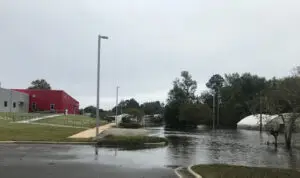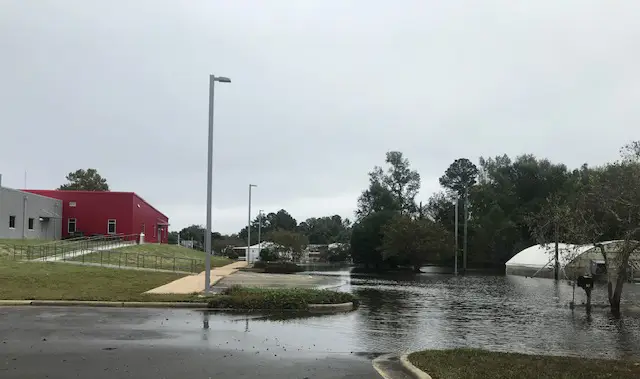The past two years have brought historic hurricane devastation to North Carolina’s eastern communities – both coastal and inland. Even as the region was recovering from 2016’s Hurricane Matthew, Hurricane Florence stalled over many of the same communities for days. The region was once again facing catastrophic damage and the need for recovery.
The Golden LEAF Foundation is administering state appropriated funding for long-term recovery from both Hurricane Matthew and Hurricane Florence and administering the privately funded Governor’s NC Hurricane Florence Disaster Relief fund to quickly help communities in need. Despite the misfortune in this region over the past two years, state leaders are working quickly with organizations like Golden LEAF to ensure that natural disasters don’t evolve into long-term economic disasters for the most hard-hit communities.

This July, the Lenoir County Cooperative Extension celebrated the opening of its new building on an elevated site with help from Hurricane Matthew Disaster Recovery funds.
These funds have already produced benefit and withstood tests. Examples of the resilience of Eastern North Carolina communities, when aided by Matthew recovery funding include the Lenoir County Cooperative Extension Office and Bladen County’s water supply. In July 2018, the Lenoir County Cooperative Extension Office reopened after being destroyed in Hurricane Matthew’s 2016 floods. With funding the original building was demolished and the existing site was elevated several feet above the floodplain to enable the construction of the replacement Extension office.
“Restoring our former office facility was no longer an option as it had flooded three times,” said Tammy Kelly, Lenoir County Extension Director. “Without the Golden LEAF grant, our Lenoir County Center would have been forced to relocate.”
Kelly said other relocation options were too small for the county extension’s operation and would have forced the office further away from the neighboring Livestock Arena and the bulk of the region’s agricultural community. Golden LEAF’s $1.4 million grant helped lock-in the location and timeline for the new Extension office, which provides many services and resources to local residents.
During Hurricane Florence, Lenoir County was once again hit hard by flooding. Fortunately because of the new design above the floodplain, the new Lenoir County Cooperative Extension did not flood.

During Hurricane Florence, the new Cooperative Extension Office (left) stayed completely dry; although, it was surrounded by water. The greenhouse (right) which remains in its original position flooded about 18 inches.
“Our office was completely dry,” said Kelly. “It was surrounded by water, but remained dry. I cannot even describe the relief our staff felt throughout Hurricane Florence. We are so fortunate to have been able to reconstruct in the same location, and be high and dry throughout this event.”
That’s not the only positive example. Also during 2016’s Hurricane Matthew, Bladen County sustained electrical power loss for days. The county struggled to keep water service to its customers because of insufficient generators to keep the wells pumping.
Golden LEAF awarded Bladen County a $390,000 grant in December 2017 to install electric power generators at four of its well sites.
“With a tight schedule for the project, our staff went straight to work,” said Kip McClary, General Services Manager for the County of Bladen. “The generators were installed in record time and made ready for service in August 2018, just in time for a visit from our lingering adversary, Hurricane Florence.”

Hurricane Matthew Recovery funds supported four generators in Bladen County with automatic transfer switches. The county was able to use the generators to support the county’s water system during extended periods of power outages during Hurricane Florence.
Even though the county experienced another week without power during Hurricane Florence, the new generators were a critical resource for the community.
“The new generators proved invaluable to us during this event,” said McClary. “With the new generators supplied by the Golden LEAF Foundation, operation of the water system was flawless, and Bladen County kept water service on to all of its customers and assisted some of the municipalities with supplying their citizens also.”
Bladen County sees the grant as a long-term strategy for helping communities in economically distressed areas.
“Some communities struggle with revenues to provide the most basic of services and having funds available through the Golden LEAF Foundation to help communities recover and help mitigate the effects of future events is a blessing,” said McClary. “It sure helped Bladen County to be able to sustain a water system and provide safe drinking water to families throughout the area in a time when they desperately needed it.”

